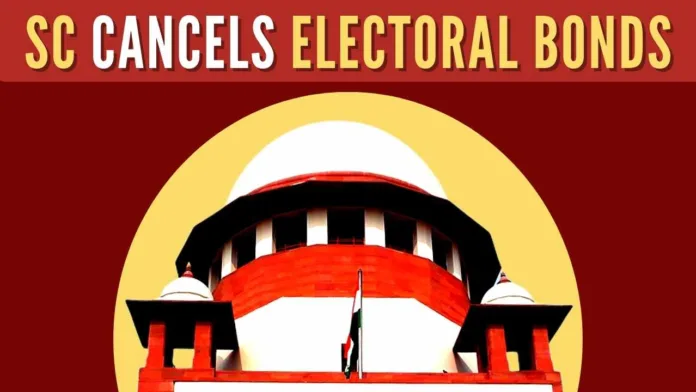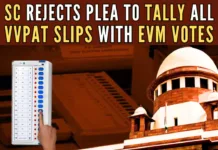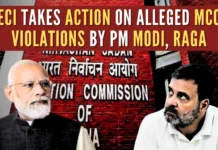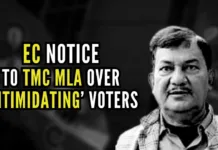
SC strikes down electoral bonds scheme as unconstitutional
In a big setback to the Modi government, the Supreme Court of India on Thursday struck down the electoral bonds scheme that allows anonymous donations to political parties. In a unanimous judgment, the five-judge Constitution bench of Chief Justice of India D Y Chandrachud and Justices Sanjiv Khanna, B R Gavai, J B Pardiwala, and Manoj Misra quashed the scheme as well as amendments made to the Income Tax Act and the Representation of People Act which had made the donations anonymous.
The apex court ordered the State Bank of India (SBI) to stop the electoral bonds forthwith and directed to give the list of all donors to political parties by March 6 to the Election Commission. The landmark judgment also ordered the Election Commission to publish all details of donors and receivers of electoral bonds by March 13. The court also directed political parties to return the not encashed electoral bonds to donors.
Electoral Bonds started in 2018 and as per details available more than Rs.16,500 crores were issued and BJP got the maximum of more than Rs.6,500 crore. The Court held that the electoral bonds scheme due to its anonymous nature is violative of right to information and thus hits free speech and expression under Article 19(1)(a) of the Constitution. “Electoral Bonds Scheme, proviso to Section 29(1)(c) as amended by Section 139 of Income Tax Act and Section 13(b) as amended by Finance Act 2017 is violative of Article 19(1)(a),” the judgment said.
The Court ordered that the issuing bank of electoral bonds, that is State Bank of India (SBI) should issue details of the political parties that received electoral bonds and all the particulars received and submit them to the Election Commission of India (ECI) by March 6.
There were two judgments, one authored by CJI D Y Chandrachud and the other by Justice Sanjiv Khanna, both concurring. The Court held that the scheme will help the party in power to gain an advantage. Noted lawyers Kapil Sibal and Prashant Bhushan led the arguments for the petitioners. Welcoming the judgment, Prashant Bhushan said this verdict will make a far-reaching impact on electoral democracy and polity.
Kudos to the SC for striking down anonymous Electoral Bonds & also the unlimited funding by corporations of Political parties.
SC has also directed disclosure of Bonds encashed so far: Who gave to whom?
This will have a far reaching impact on our electoral democracy & polity.— Prashant Bhushan (@pbhushan1) February 15, 2024
“Economic inequality leads to differing levels of political engagements. Access to info leads to influencing the policy-making and also leading to quid pro quo arrangements may also help a party by the party in power,” the judgment said. The Court also held that the electoral bonds scheme cannot be justified by saying that it will help curb black money in politics. The Court further said that while the privacy of donors is important, transparency in political funding cannot be achieved by granting absolute exemptions.
Modi government brought the electoral bonds in 2018 when Arun Jaitley was Finance Minister through a controversial route. As the government had no majority, the bonds were implemented as a Money Bill, which needed only Lok Sabha’s clearance.
For all the latest updates, download PGurus App.
- Supreme Court rejects plea to tally all VVPAT slips with EVM votes; says ‘no going back to paper ballot’ - April 26, 2024
- US report citing human rights violations is deeply biased: India - April 25, 2024
- Kotak Mahindra Bank shares tank 13%. Market Cap erodes by Rs.37,721 cr post-RBI action - April 25, 2024










